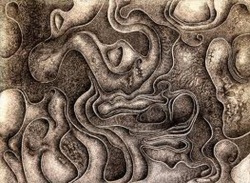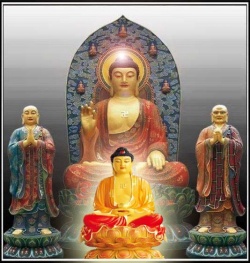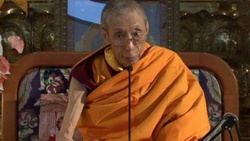Difference between revisions of "Kisāgotamīsuttaṁ: The Discourse about Kisāgotamī"
| Line 1: | Line 1: | ||
| + | {{SeealsoDPL/button}} | ||
<nomobile>{{DisplayImages|495|4522|4028|3685|2609|3847|2732|2307}}</nomobile> | <nomobile>{{DisplayImages|495|4522|4028|3685|2609|3847|2732|2307}}</nomobile> | ||
| + | |||
| + | |||
| + | |||
| + | |||
{{Centre|<big><big>[[Kisāgotamīsuttaṁ]]<br/> | {{Centre|<big><big>[[Kisāgotamīsuttaṁ]]<br/> | ||
The Discourse about [[Kisāgotamī]] </big></big>}} | The Discourse about [[Kisāgotamī]] </big></big>}} | ||
| Line 14: | Line 19: | ||
Atha kho [[Kisāgotamī]] [[bhikkhunī]], pubbaṇhasamayaṁ nivāsetvā, | Atha kho [[Kisāgotamī]] [[bhikkhunī]], pubbaṇhasamayaṁ nivāsetvā, | ||
| − | Then the [[nun]] [[Kisāgotamī]], <ref>{{Nolinking|Comm: Kisāgotamī ti, appamaṁsalohitatāya kisā, Gotamī ti panassā nāmaṁ. Pubbe kira Sāvatthiyaṁ ekasmiṁ kule asītikoṭidhanaṁ sabbaṁ aṅgārā va jātaṁ. Kuṭumbiko aṅgārajātāni anīharitvā: “Avassaṁ koci puññavā bhavissati, tassa puññena puna pākatikaṁ bhavissatī.” ti Suvaṇṇahiraññassa cāṭiyo pūretvā, āpaṇe ṭhapetvā samīpe nisīdi. Athekā duggatakulassa dhītā: “Aḍḍhamāsakaṁ gahetvā, dārusākaṁ āharissāmī,” ti vīthiṁ gatā taṁ disvā kuṭumbikaṁ āha: “Āpaṇe tāva dhanaṁ ettakaṁ, gehe kittakaṁ bhavissatī?” ti “Kiṁ disvā amma evaṁ kathesī?” ti “Imaṁ hiraññasuvaṇṇan!”-ti So: “Puññavatī esā bhavissatī.” ti }}[[Kisāgotamī]], because of having little flesh and {{Wiki|blood}} she was called thin (Kisā), [[Gotamī]] is her ({{Wiki|clan}}) [[name]]. In the {{Wiki|past}} it seems in a certain [[family]] in [[Sāvatthī]] having 80,000 in [[wealth]] it all turned to ashes. The head of the [[family]], having not thrown away those ashes ([[thought]]): “Inevitably there will be some [[merit]] (remaining), and it will be possible to restore (the [[wealth]]) through that [[merit]].” Having filled golden coloured vessels (with the ashes), and set them up in the market, he sat down close by. Then a certain poor family's daughter ([[thinking]]): “Having got a halfpenny, I can carry away some [[wood]] and vegetables,” while going along the road said this to the head of the [[family]]: “You have so much [[wealth]] in the market, how much will there be in the home?” “Having seen what, dear girl, do you speak thus?” “This is [[pure]] {{Wiki|gold}}!” He ([[thought]]): “She must be endowed with [[merit]].” </ref> <ref>{{Nolinking|Tassā vasanaṭṭhānaṁ pucchitvā, āpaṇe bhaṇḍaṁ paṭisāmetvā, tassā mātāpitaro upasaṅkamitvā evam-āha: “Amhākaṁ gehe vayappatto dārako atthi, tassetaṁ dārikaṁ dethā” ti. “Kiṁ Sāmi duggatehi saddhiṁ keḷiṁ karosī ti?” “Mittasanthavo nāma duggatehi pi saddhiṁ hoti, detha naṁ, Kuṭumbasāminī bhavissatī,” ti naṁ gahetvā gharaṁ ānesi. Sā saṁvāsam-anvāya puttaṁ vijātā. Putto padasā āhiṇḍanakāle kālam-akāsi. Sā duggatakule uppajjitvā, mahākulaṁ gantvā pi: “Puttavināsaṁ pattāmhī.” ti Uppannabalavasokā, puttassa sarīrakiccaṁ vāretvā, taṁ matakaḷevaraṁ ādāya nagare vippalapantī carati. Ekadivasaṁ mahatiyā Buddhavīthiyā Dasabalassa santikaṁ gantvā: “Puttassa me arogabhāvatthāya bhesajjaṁ detha Bhagavā” ti āha. “Gaccha Sāvatthiṁ āhiṇḍitvā, yasmiṁ gehe matapubbo natthi, tato siddhatthakaṁ āhara, puttassa te bhesajjaṁ bhavissatī.” ti Sā nagaraṁ pavisitvā, dhuragehato paṭṭhāya, Bhagavatā vuttanayena gantvā, siddhatthakaṁ yācantī ghare ghare, “Kuto tvaṁ evarūpaṁ gharaṁ passissasī?” ti vuttā. Katipayāni gehāni āhiṇḍitvā: “Sabbesam-pi kirāyaṁ dhammatā, na mayhaṁ puttassevā.” ti Sālāyaṁ chavaṁ chaḍḍetvā pabbajjaṁ yāci. Satthā: “imaṁ pabbājetū” ti bhikkhuni-upassayaṁ pesesi. Sā khuragge yeva Arahattaṁ pāpuṇi. Imaṁ Theriṁ sandhāya: “Atha kho Kisāgotamī...” ti vuttaṁ.}} Having asked the place she was living, and set in order his goods at the market, he approached her mother and father and said this: “In our house there is a young boy growing up, give her to this boy.” “Why, [[Master]], do you play with poor [[people]] (like us)?” “(I am) known as an intimate [[friend]] to the poor, give her, and she will be the wife of the head of the [[family]],” and having taken her he led her to the house. After intercourse she became one who had borne a son. The son, at one time when he was wandering around on foot, [[died]]. Having been born in a poor [[family]], she went to the great [[family]] (and said): “My son has come to destruction.” Being overcome by [[grief]], she put aside the duties to her son's [[body]], and took his [[dead]] [[body]] and roamed about wailing in the city. One day, having drawn close to the [[Buddha]], the One of [[Ten Powers]], on the highway: She said: “My son has fallen ill, give some [[medicine]], Gracious One.” “Go, and having wandered in [[Sāvatthī]], from a house where there has formerly been no [[deaths]], bring a [[mustard seed]], and that will be [[medicine]] for your son.” She entered the city, and beginning from the nearest house, she went in accordance with the Gracious One's words, begging for [[mustard seed]] from house to house, “Where will you find such a house?” they said. Having wandered to several homes (she understood): “It seems to be a general {{Wiki|rule}} everywhere (that [[people]] [[die]]), not only my son.” Having left the corpse in a shed she asked for the going-forth. The [[Teacher]] sent her to the [[nunnery]] and said: “Give her the going-forth.” In the razor hall itself (while they were still giving her the going-forth) she [[attained]] Worthiness. In connection with this Elder: “Then [[Kisāgotamī]]...” was said.</ref> having dressed in the morning time, | + | Then the [[nun]] [[Kisāgotamī]], <ref>{{Nolinking|Comm: Kisāgotamī ti, appamaṁsalohitatāya kisā, Gotamī ti panassā nāmaṁ. Pubbe kira Sāvatthiyaṁ ekasmiṁ kule asītikoṭidhanaṁ sabbaṁ aṅgārā va jātaṁ. Kuṭumbiko aṅgārajātāni anīharitvā: “Avassaṁ koci puññavā bhavissati, tassa puññena puna pākatikaṁ bhavissatī.” ti Suvaṇṇahiraññassa cāṭiyo pūretvā, āpaṇe ṭhapetvā samīpe nisīdi. Athekā duggatakulassa dhītā: “Aḍḍhamāsakaṁ gahetvā, dārusākaṁ āharissāmī,” ti vīthiṁ gatā taṁ disvā kuṭumbikaṁ āha: “Āpaṇe tāva dhanaṁ ettakaṁ, gehe kittakaṁ bhavissatī?” ti “Kiṁ disvā amma evaṁ kathesī?” ti “Imaṁ hiraññasuvaṇṇan!”-ti So: “Puññavatī esā bhavissatī.” ti }} |
| + | |||
| + | |||
| + | |||
| + | [[Kisāgotamī]], because of having little flesh and {{Wiki|blood}} she was called thin ([[Kisā]]), [[Gotamī]] is her ({{Wiki|clan}}) [[name]]. In the {{Wiki|past}} it seems in a certain [[family]] in [[Sāvatthī]] having 80,000 in [[wealth]] it all turned to ashes. The head of the [[family]], having not thrown away those ashes ([[thought]]): “Inevitably there will be some [[merit]] (remaining), and it will be possible to restore (the [[wealth]]) through that [[merit]].” | ||
| + | |||
| + | Having filled golden coloured vessels (with the ashes), and set them up in the market, he sat down close by. Then a certain poor family's daughter ([[thinking]]): | ||
| + | |||
| + | “Having got a halfpenny, I can carry away some [[wood]] and vegetables,” while going along the road said this to the head of the [[family]]: “You have so much [[wealth]] in the market, how much will there be in the home?” “Having seen what, dear girl, do you speak thus?” “This is [[pure]] {{Wiki|gold}}!” He ([[thought]]): “She must be endowed with [[merit]]. | ||
| + | |||
| + | |||
| + | |||
| + | ” </ref> <ref>{{Nolinking|Tassā vasanaṭṭhānaṁ pucchitvā, āpaṇe bhaṇḍaṁ paṭisāmetvā, tassā mātāpitaro upasaṅkamitvā evam-āha: “Amhākaṁ gehe vayappatto dārako atthi, tassetaṁ dārikaṁ dethā” ti. “Kiṁ Sāmi duggatehi saddhiṁ keḷiṁ karosī ti?” “Mittasanthavo nāma duggatehi pi saddhiṁ hoti, detha naṁ, Kuṭumbasāminī bhavissatī,” ti naṁ gahetvā gharaṁ ānesi. Sā saṁvāsam-anvāya puttaṁ vijātā. Putto padasā āhiṇḍanakāle kālam-akāsi. Sā duggatakule uppajjitvā, mahākulaṁ gantvā pi: “Puttavināsaṁ pattāmhī.” ti Uppannabalavasokā, puttassa sarīrakiccaṁ vāretvā, taṁ matakaḷevaraṁ ādāya nagare vippalapantī carati. Ekadivasaṁ mahatiyā Buddhavīthiyā Dasabalassa santikaṁ gantvā: “Puttassa me arogabhāvatthāya bhesajjaṁ detha Bhagavā” ti āha. “Gaccha Sāvatthiṁ āhiṇḍitvā, yasmiṁ gehe matapubbo natthi, tato siddhatthakaṁ āhara, puttassa te bhesajjaṁ bhavissatī.” ti Sā nagaraṁ pavisitvā, dhuragehato paṭṭhāya, Bhagavatā vuttanayena gantvā, siddhatthakaṁ yācantī ghare ghare, “Kuto tvaṁ evarūpaṁ gharaṁ passissasī?” ti vuttā. Katipayāni gehāni āhiṇḍitvā: “Sabbesam-pi kirāyaṁ dhammatā, na mayhaṁ puttassevā.” ti Sālāyaṁ chavaṁ chaḍḍetvā pabbajjaṁ yāci. Satthā: “imaṁ pabbājetū” ti bhikkhuni-upassayaṁ pesesi. Sā khuragge yeva Arahattaṁ pāpuṇi. | ||
| + | |||
| + | Imaṁ Theriṁ sandhāya: | ||
| + | |||
| + | “Atha kho Kisāgotamī...” ti vuttaṁ.}} Having asked the place she was living, and set in order his goods at the market, he approached her mother and father and said this: “In our house there is a young boy growing up, give her to this boy.” “Why, [[Master]], do you play with poor [[people]] (like us)?” “(I am) known as an intimate [[friend]] to the poor, give her, and she will be the wife of the head of the [[family]],” and having taken her he led her to the house. | ||
| + | |||
| + | After intercourse she became one who had borne a son. The son, at one time when he was wandering around on foot, [[died]]. Having been born in a poor [[family]], she went to the great [[family]] (and said): “My son has come to destruction.” Being overcome by [[grief]], she put aside the duties to her son's [[body]], and took his [[dead]] [[body]] and roamed about wailing in the city. One day, having drawn close to the [[Buddha]], the One of [[Ten Powers]], on the highway: | ||
| + | |||
| + | She said: “My son has fallen ill, give some [[medicine]], Gracious One.” “Go, and having wandered in [[Sāvatthī]], from a house where there has formerly been no [[deaths]], bring a [[mustard seed]], and that will be [[medicine]] for your son.” She entered the city, and beginning from the nearest house, she went in accordance with the Gracious One's words, begging for [[mustard seed]] from house to house, “Where will you find such a house?” they said. | ||
| + | |||
| + | Having wandered to several homes (she understood): “It seems to be a general {{Wiki|rule}} everywhere (that [[people]] [[die]]), not only my son.” Having left the corpse in a shed she asked for the going-forth. The [[Teacher]] sent her to the [[nunnery]] and said: “Give her the going-forth.” In the razor hall itself (while they were still giving her the going-forth) she [[attained]] Worthiness. In connection with this Elder: “Then [[Kisāgotamī]]...” was said.</ref> having dressed in the morning time, | ||
| + | |||
pattacīvaram-ādāya, Sāvatthiṁ piṇḍāya pāvisi. | pattacīvaram-ādāya, Sāvatthiṁ piṇḍāya pāvisi. | ||
| Line 46: | Line 74: | ||
“Kiṁ nu tvaṁ mataputtāva, ekam-āsi rudam-mukhī, | “Kiṁ nu tvaṁ mataputtāva, ekam-āsi rudam-mukhī, | ||
| + | |||
“Why do you, like one with a [[dead]] son, sit {{Wiki|solitary}} <ref>{{Nolinking|Comm: ekam-āsī-ti ekā āsi; word-analysis.}}</ref> with a tearful face, <ref>{{Nolinking|Comm: rudam-mukhī ti rudamānamukhī viya; }}with a tearful face means like someone with a tearful face.</ref> | “Why do you, like one with a [[dead]] son, sit {{Wiki|solitary}} <ref>{{Nolinking|Comm: ekam-āsī-ti ekā āsi; word-analysis.}}</ref> with a tearful face, <ref>{{Nolinking|Comm: rudam-mukhī ti rudamānamukhī viya; }}with a tearful face means like someone with a tearful face.</ref> | ||
Vanam-ajjhagatā ekā, purisaṁ nu gavesasī?” ti | Vanam-ajjhagatā ekā, purisaṁ nu gavesasī?” ti | ||
| + | |||
Having entered the [[Wood]] alone, do you seek for a man?” | Having entered the [[Wood]] alone, do you seek for a man?” | ||
| Line 54: | Line 84: | ||
Atha kho Kisāgotamiyā bhikkhuniyā etad-ahosi: | Atha kho Kisāgotamiyā bhikkhuniyā etad-ahosi: | ||
| + | |||
Then it occurred to the [[nun]] [[Kisāgotamī]]: | Then it occurred to the [[nun]] [[Kisāgotamī]]: | ||
“Ko nu khvāyaṁ manusso vā amanusso vā gāthaṁ bhāsatī?” ti | “Ko nu khvāyaṁ manusso vā amanusso vā gāthaṁ bhāsatī?” ti | ||
| + | |||
“Who is this, a [[human]] or a {{Wiki|non-human}}, {{Wiki|speaking}} this verse?” | “Who is this, a [[human]] or a {{Wiki|non-human}}, {{Wiki|speaking}} this verse?” | ||
Atha kho Kisāgotamiyā bhikkhuniyā etad-ahosi: | Atha kho Kisāgotamiyā bhikkhuniyā etad-ahosi: | ||
| + | |||
Then it occurred to the [[nun]] [[Kisāgotamī]]: | Then it occurred to the [[nun]] [[Kisāgotamī]]: | ||
| Line 66: | Line 99: | ||
mama bhayaṁ chambhitattaṁ lomahaṁsaṁ uppādetukāmo, | mama bhayaṁ chambhitattaṁ lomahaṁsaṁ uppādetukāmo, | ||
| + | |||
[[desiring]] to give rise to {{Wiki|fear}}, {{Wiki|terror}}, and [[horror]] in me, | [[desiring]] to give rise to {{Wiki|fear}}, {{Wiki|terror}}, and [[horror]] in me, | ||
samādhimhā cāvetukāmo, gāthaṁ bhāsatī.” ti | samādhimhā cāvetukāmo, gāthaṁ bhāsatī.” ti | ||
| + | |||
[[desiring]] to drive me out of [[concentration]], who speaks this verse.” | [[desiring]] to drive me out of [[concentration]], who speaks this verse.” | ||
Atha kho [[Kisāgotamī]] [[bhikkhunī]]: Māro ayaṁ Pāpimā iti viditvā, | Atha kho [[Kisāgotamī]] [[bhikkhunī]]: Māro ayaṁ Pāpimā iti viditvā, | ||
| + | |||
Then the [[nun]] [[Kisāgotamī]] having understood: This is the Wicked [[Māra]], | Then the [[nun]] [[Kisāgotamī]] having understood: This is the Wicked [[Māra]], | ||
| Line 79: | Line 115: | ||
| − | “Accantaṁ mataputtāmhi, purisā etad-antikā, | + | “Accantaṁ mataputtāmhi, purisā etad-antikā, “I am at the end of [[dead]] sons, |
| − | “I am at the end of [[dead]] sons, <ref>{{Nolinking|Comm: accantaṁ mataputtāmhī ti ettha antaṁ atītaṁ accantaṁ, bhāvanapuṁsakam-etaṁ. Idaṁ vuttaṁ hoti: yathā puttamaraṇaṁ antaṁ atītaṁ hoti, evaṁ mataputtā ahaṁ, idāni mama puna puttamaraṇaṁ nāma natthi;}} I am at the end of [[dead]] sons means now I am at the end, gone {{Wiki|past}}, I sit aside (such is the sub-commentarial explanation of this strange [[phrase]]). This is what is said: just as there is a {{Wiki|past}}, and end of [[dead]] sons, so I am [[dead]] to sons, now there is nothing known as a [[dead]] son.</ref> (I am) finished with men, <ref>{{Nolinking|Comm: purisā etadantikā ti purisā pi me etad-antikā va, yo me puttamaraṇassa anto, purisānam-pi me esevanto, abhabbā ahaṁ idāni purisaṁ gavesitun-ti;}} I am one who is finished with men means for me there is an end of men, for me in whom there is an end of [[dead]] sons there is also an end of men, it is impossible now to seek for men.}}</ref> | + | |
| + | <ref>{{Nolinking|Comm: accantaṁ mataputtāmhī ti ettha antaṁ atītaṁ accantaṁ, bhāvanapuṁsakam-etaṁ. Idaṁ vuttaṁ hoti: yathā puttamaraṇaṁ antaṁ atītaṁ hoti, evaṁ mataputtā ahaṁ, idāni mama puna puttamaraṇaṁ nāma natthi;}} | ||
| + | |||
| + | I am at the end of [[dead]] sons means now I am at the end, gone {{Wiki|past}}, I sit aside (such is the sub-commentarial explanation of this strange [[phrase]]). This is what is said: just as there is a {{Wiki|past}}, and end of [[dead]] sons, so I am [[dead]] to sons, now there is nothing known as a [[dead]] son.</ref> (I am) finished with men, | ||
| + | |||
| + | <ref>{{Nolinking|Comm: purisā etadantikā ti purisā pi me etad-antikā va, yo me puttamaraṇassa anto, purisānam-pi me esevanto, abhabbā ahaṁ idāni purisaṁ gavesitun-ti;}} | ||
| + | |||
| + | I am one who is finished with men means for me there is an end of men, for me in whom there is an end of [[dead]] sons there is also an end of men, it is impossible now to seek for men.}}</ref> | ||
| + | |||
Na socāmi na rodāmi, na taṁ bhāyāmi āvuso. | Na socāmi na rodāmi, na taṁ bhāyāmi āvuso. | ||
I do not grieve, I do not cry, I am not afraid of you, [[friend]]. | I do not grieve, I do not cry, I am not afraid of you, [[friend]]. | ||
| + | |||
Sabbattha vihatā [[nandi]], tamokkhandho padālito, | Sabbattha vihatā [[nandi]], tamokkhandho padālito, | ||
| − | Everywhere [[delight]] is [[dead]], <ref>{{Nolinking|Comm: sabbattha vihatā nandī ti sabbesu khandhāyatanadhātubhavayonigatiṭhitinivāsesu mama taṇhānandī vihatā;}} everywhere [[delight]] is [[dead]] means my [[delight]] and [[craving]] for all {{Wiki|dwellings}}, continuation, persistence, destinations, [[realms]] or states involving the constituents, the [[sense]] [[spheres]] or the [[elements]] is [[dead]].</ref> broken <ref>{{Nolinking|Comm: padālito ti ñāṇena bhinno; }}destroyed means broken through [[knowledge]].</ref> is the dark {{Wiki|mass}}, <ref>{{Nolinking|Comm: tamokkhandho ti avijjākkhandho; }}the {{Wiki|mass}} of {{Wiki|darkness}} means the the {{Wiki|mass}} of [[ignorance]].</ref> | + | Everywhere [[delight]] is [[dead]], <ref>{{Nolinking|Comm: sabbattha vihatā nandī ti sabbesu khandhāyatanadhātubhavayonigatiṭhitinivāsesu mama taṇhānandī vihatā;}} everywhere [[delight]] is [[dead]] means my [[delight]] and [[craving]] for all {{Wiki|dwellings}}, continuation, persistence, destinations, [[realms]] or states involving the constituents, the [[sense]] [[spheres]] or the [[elements]] is [[dead]]. |
| + | </ref> broken <ref>{{Nolinking|Comm: padālito ti ñāṇena bhinno; }}destroyed means broken through [[knowledge]].</ref> is the dark {{Wiki|mass}}, <ref>{{Nolinking|Comm: tamokkhandho ti avijjākkhandho; }}the {{Wiki|mass}} of {{Wiki|darkness}} means the the {{Wiki|mass}} of [[ignorance]].</ref> | ||
Jetvāna Maccuno senaṁ, viharāmi anāsavā.” ti | Jetvāna Maccuno senaṁ, viharāmi anāsavā.” ti | ||
Latest revision as of 17:05, 29 November 2015
Click here to see other articles relating to word Kisāgotamīsuttaṁ: The Discourse about Kisāgotamī
Kisāgotamīsuttaṁ
The Discourse about Kisāgotamī
164. Evaṁ me sutaṁ:
Thus I have heard:
ekaṁ samayaṁ Bhagavā Sāvatthiyaṁ viharati
at one time the Gracious One was dwelling near Sāvatthī
Jetavane Anāthapiṇḍikassa ārāme.
at Anāthapiṇḍika's grounds in Jeta's Wood.
Atha kho Kisāgotamī bhikkhunī, pubbaṇhasamayaṁ nivāsetvā,
Then the nun Kisāgotamī, [1] [2] having dressed in the morning time,
pattacīvaram-ādāya, Sāvatthiṁ piṇḍāya pāvisi.
after picking up her bowl and robe, was entering Sāvatthī for alms.
Sāvatthiyaṁ piṇḍāya caritvā, pacchābhattaṁ piṇḍapātapaṭikkantā,
After walking for alms in Sāvatthī, and returning from the alms-round after the meal,
yena Andhavanaṁ tenupasaṅkami divāvihārāya,
she approached the Blind Man's Wood to pass the day,
Andhavanaṁ ajjhogahetvā,
and having entered Blind Man's Wood,
aññatarasmiṁ rukkhamūle divāvihāraṁ nisīdi.
she sat down at the root of a certain tree to pass the day.
Atha kho Māro Pāpimā
Then the Wicked Māra
Kisāgotamiyā bhikkhuniyā bhayaṁ chambhitattaṁ lomahaṁsaṁ uppādetukāmo,
desiring to give rise to fear, terror, and horror in the nun Kisāgotamī,
samādhimhā cāvetukāmo, yena Kisāgotamī bhikkhunī tenupasaṅkami,
desiring to drive her out of concentration, approached the nun Kisāgotamī,
upasaṅkamitvā Kisāgotamiṁ bhikkhuniṁ gāthāya ajjhabhāsi:
and after approaching he addressed the nun Kisāgotamī with a verse:
“Kiṁ nu tvaṁ mataputtāva, ekam-āsi rudam-mukhī,
“Why do you, like one with a dead son, sit solitary [3] with a tearful face, [4]
Vanam-ajjhagatā ekā, purisaṁ nu gavesasī?” ti
Having entered the Wood alone, do you seek for a man?”
Atha kho Kisāgotamiyā bhikkhuniyā etad-ahosi:
Then it occurred to the nun Kisāgotamī:
“Ko nu khvāyaṁ manusso vā amanusso vā gāthaṁ bhāsatī?” ti
“Who is this, a human or a non-human, speaking this verse?”
Atha kho Kisāgotamiyā bhikkhuniyā etad-ahosi:
Then it occurred to the nun Kisāgotamī:
“Māro kho ayaṁ Pāpimā
“This is the Wicked Māra
mama bhayaṁ chambhitattaṁ lomahaṁsaṁ uppādetukāmo,
desiring to give rise to fear, terror, and horror in me,
samādhimhā cāvetukāmo, gāthaṁ bhāsatī.” ti
desiring to drive me out of concentration, who speaks this verse.”
Atha kho Kisāgotamī bhikkhunī: Māro ayaṁ Pāpimā iti viditvā,
Then the nun Kisāgotamī having understood: This is the Wicked Māra,
Māraṁ Pāpimantaṁ gāthāhi paccabhāsi:
replied with these verses to the Wicked Māra:
“Accantaṁ mataputtāmhi, purisā etad-antikā, “I am at the end of dead sons,
[5] (I am) finished with men,
[6]
Na socāmi na rodāmi, na taṁ bhāyāmi āvuso.
I do not grieve, I do not cry, I am not afraid of you, friend.
Sabbattha vihatā nandi, tamokkhandho padālito,
Everywhere delight is dead, [7] broken [8] is the dark mass, [9]
Jetvāna Maccuno senaṁ, viharāmi anāsavā.” ti
Having defeated Death's army, I live without pollutants.”
Atha kho Māro Pāpimā: “Jānāti maṁ Kisāgotamī bhikkhunī” ti
Then the Wicked Māra (thought): “The nun Kisāgotamī knows me!”
dukkhī dummano tatthevantaradhāyī ti.
and pained and depressed he vanished right there.
Footnotes
- ↑ Comm: Kisāgotamī ti, appamaṁsalohitatāya kisā, Gotamī ti panassā nāmaṁ. Pubbe kira Sāvatthiyaṁ ekasmiṁ kule asītikoṭidhanaṁ sabbaṁ aṅgārā va jātaṁ. Kuṭumbiko aṅgārajātāni anīharitvā: “Avassaṁ koci puññavā bhavissati, tassa puññena puna pākatikaṁ bhavissatī.” ti Suvaṇṇahiraññassa cāṭiyo pūretvā, āpaṇe ṭhapetvā samīpe nisīdi. Athekā duggatakulassa dhītā: “Aḍḍhamāsakaṁ gahetvā, dārusākaṁ āharissāmī,” ti vīthiṁ gatā taṁ disvā kuṭumbikaṁ āha: “Āpaṇe tāva dhanaṁ ettakaṁ, gehe kittakaṁ bhavissatī?” ti “Kiṁ disvā amma evaṁ kathesī?” ti “Imaṁ hiraññasuvaṇṇan!”-ti So: “Puññavatī esā bhavissatī.” ti
Kisāgotamī, because of having little flesh and blood she was called thin (Kisā), Gotamī is her (clan) name. In the past it seems in a certain family in Sāvatthī having 80,000 in wealth it all turned to ashes. The head of the family, having not thrown away those ashes (thought): “Inevitably there will be some merit (remaining), and it will be possible to restore (the wealth) through that merit.”
Having filled golden coloured vessels (with the ashes), and set them up in the market, he sat down close by. Then a certain poor family's daughter (thinking):
“Having got a halfpenny, I can carry away some wood and vegetables,” while going along the road said this to the head of the family: “You have so much wealth in the market, how much will there be in the home?” “Having seen what, dear girl, do you speak thus?” “This is pure gold!” He (thought): “She must be endowed with merit.
” - ↑ Tassā vasanaṭṭhānaṁ pucchitvā, āpaṇe bhaṇḍaṁ paṭisāmetvā, tassā mātāpitaro upasaṅkamitvā evam-āha: “Amhākaṁ gehe vayappatto dārako atthi, tassetaṁ dārikaṁ dethā” ti. “Kiṁ Sāmi duggatehi saddhiṁ keḷiṁ karosī ti?” “Mittasanthavo nāma duggatehi pi saddhiṁ hoti, detha naṁ, Kuṭumbasāminī bhavissatī,” ti naṁ gahetvā gharaṁ ānesi. Sā saṁvāsam-anvāya puttaṁ vijātā. Putto padasā āhiṇḍanakāle kālam-akāsi. Sā duggatakule uppajjitvā, mahākulaṁ gantvā pi: “Puttavināsaṁ pattāmhī.” ti Uppannabalavasokā, puttassa sarīrakiccaṁ vāretvā, taṁ matakaḷevaraṁ ādāya nagare vippalapantī carati. Ekadivasaṁ mahatiyā Buddhavīthiyā Dasabalassa santikaṁ gantvā: “Puttassa me arogabhāvatthāya bhesajjaṁ detha Bhagavā” ti āha. “Gaccha Sāvatthiṁ āhiṇḍitvā, yasmiṁ gehe matapubbo natthi, tato siddhatthakaṁ āhara, puttassa te bhesajjaṁ bhavissatī.” ti Sā nagaraṁ pavisitvā, dhuragehato paṭṭhāya, Bhagavatā vuttanayena gantvā, siddhatthakaṁ yācantī ghare ghare, “Kuto tvaṁ evarūpaṁ gharaṁ passissasī?” ti vuttā. Katipayāni gehāni āhiṇḍitvā: “Sabbesam-pi kirāyaṁ dhammatā, na mayhaṁ puttassevā.” ti Sālāyaṁ chavaṁ chaḍḍetvā pabbajjaṁ yāci. Satthā: “imaṁ pabbājetū” ti bhikkhuni-upassayaṁ pesesi. Sā khuragge yeva Arahattaṁ pāpuṇi.
Imaṁ Theriṁ sandhāya:
“Atha kho Kisāgotamī...” ti vuttaṁ. Having asked the place she was living, and set in order his goods at the market, he approached her mother and father and said this: “In our house there is a young boy growing up, give her to this boy.” “Why, Master, do you play with poor people (like us)?” “(I am) known as an intimate friend to the poor, give her, and she will be the wife of the head of the family,” and having taken her he led her to the house.
After intercourse she became one who had borne a son. The son, at one time when he was wandering around on foot, died. Having been born in a poor family, she went to the great family (and said): “My son has come to destruction.” Being overcome by grief, she put aside the duties to her son's body, and took his dead body and roamed about wailing in the city. One day, having drawn close to the Buddha, the One of Ten Powers, on the highway:
She said: “My son has fallen ill, give some medicine, Gracious One.” “Go, and having wandered in Sāvatthī, from a house where there has formerly been no deaths, bring a mustard seed, and that will be medicine for your son.” She entered the city, and beginning from the nearest house, she went in accordance with the Gracious One's words, begging for mustard seed from house to house, “Where will you find such a house?” they said.
Having wandered to several homes (she understood): “It seems to be a general rule everywhere (that people die), not only my son.” Having left the corpse in a shed she asked for the going-forth. The Teacher sent her to the nunnery and said: “Give her the going-forth.” In the razor hall itself (while they were still giving her the going-forth) she attained Worthiness. In connection with this Elder: “Then Kisāgotamī...” was said. - ↑ Comm: ekam-āsī-ti ekā āsi; word-analysis.
- ↑ Comm: rudam-mukhī ti rudamānamukhī viya; with a tearful face means like someone with a tearful face.
- ↑ Comm: accantaṁ mataputtāmhī ti ettha antaṁ atītaṁ accantaṁ, bhāvanapuṁsakam-etaṁ. Idaṁ vuttaṁ hoti: yathā puttamaraṇaṁ antaṁ atītaṁ hoti, evaṁ mataputtā ahaṁ, idāni mama puna puttamaraṇaṁ nāma natthi;
I am at the end of dead sons means now I am at the end, gone past, I sit aside (such is the sub-commentarial explanation of this strange phrase). This is what is said: just as there is a past, and end of dead sons, so I am dead to sons, now there is nothing known as a dead son. - ↑ Comm: purisā etadantikā ti purisā pi me etad-antikā va, yo me puttamaraṇassa anto, purisānam-pi me esevanto, abhabbā ahaṁ idāni purisaṁ gavesitun-ti;
I am one who is finished with men means for me there is an end of men, for me in whom there is an end of dead sons there is also an end of men, it is impossible now to seek for men.}} - ↑ Comm: sabbattha vihatā nandī ti sabbesu khandhāyatanadhātubhavayonigatiṭhitinivāsesu mama taṇhānandī vihatā; everywhere delight is dead means my delight and craving for all dwellings, continuation, persistence, destinations, realms or states involving the constituents, the sense spheres or the elements is dead.
- ↑ Comm: padālito ti ñāṇena bhinno; destroyed means broken through knowledge.
- ↑ Comm: tamokkhandho ti avijjākkhandho; the mass of darkness means the the mass of ignorance.







